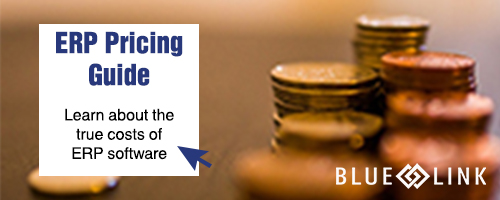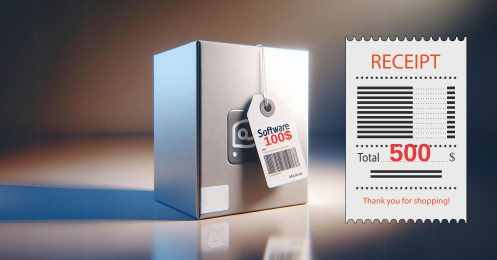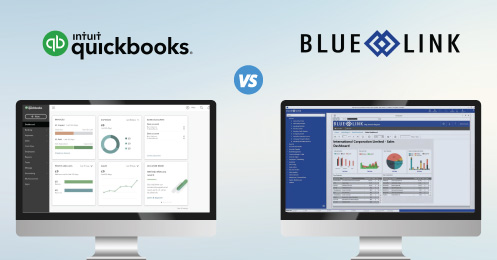There is a lot of confusion around ERP software. Firstly, what does ERP stand for? What makes a system considered ERP? What’s the difference between QuickBooks and ERP? How do I know if ERP is right for my business? This uncertainty makes it difficult when searching for new business software, especially as many software vendors tend to define and use ERP differently. In its simplest terms, ERP stands for Enterprise Resource Planning and is a business software system designed to manage all aspects of your company’s operations – accounting, inventory management, contact management, sales, warehouse management, purchasing, order entry and more. It is the combination of all these features within one system that truly defines software as ERP, and this is also what makes it different from systems like QuickBooks – which are designed to manage one specific aspect of a company’s operations (such as accounting). Below we demystify some of the other common misconceptions associated with ERP software to help you figure out if ERP is right for your business.
“I’ve heard that ERP is only for very large organizations.”
ERP systems are designed to automate processes across an organization and facilitate the flow of information from one department to another. Although this may lead some companies to believe that their processes aren’t extensive enough to warrant such software, there are varying types of ERP software systems with the ability to coordinate a few and many processes. And, while there are different types of ERP systems available in the market, ERP software is generally designed for businesses that have outgrown introductory software such as QuickBooks and are looking for more robust functionality.
“I’ve heard that ERP software is very expensive.”
ERP software systems can vary significantly in price depending on the complexity of the business requirements. Introductory software can start at as little as a couple of hundred dollars a year while the cost for a top of the tier ERP system can be in the millions. In addition, the more complex your business processes the more expensive ERP software will be as you begin to add users, features, locations etc. However, when trying to determine a budget and compare pricing, it is important to look at not only all the costs involved with purchasing ERP but also all the cost savings involved – and not just in dollar value. For example, ERP software will automate processes across your organization which can lead to a decrease in order entry errors, lower management costs and reduce the time needed to handle specific processes. ERP also allows your company to grow and increase sales volume without the need to hire additional staff. Businesses should focus on their company objectives and the value received from an ERP system instead of just the price tag.
“I’ve heard that ERP implementations can take years.”
Yes, ERP implementations are time-consuming but they don’t have to take years to implement. For SMBs, most implementations will take weeks or months to complete and include employee training, some form of data migration as well as system set-up and configuration. Depending on your business processes, requirements and resources, it is easy to predict how long the implementation process will take. For example, when it comes to employee training, the more people to train the more work will be involved. And, if employees have several different responsibilities across departments, this can also add to the necessary training time, as well as how “technical” and familiar your employees are with software in general. With data migration, if your data requires a lot of “clean-up” (for example, deleting duplicate records), and if you need to move data from multiple sources, this can also affect the time required for implementation. In general, the better prepared your company is before the implementation begins, the faster the implementation will be, allowing companies to begin using new software sooner. Lastly, the vendor’s schedule plays a large role in how long implementations take. If you want to Go-Live on a specific date, make sure you start the search well in advance to account for other implementations on the vendor’s schedule. While ERP software implementations definitely require significant time and resources, the more time dedicated to the initial implementation, the sooner you will be able to see a return on your software investment and start reaping the rewards of an all-in-one solution.
“I’ve heard that when you customize ERP, you can’t upgrade it.”
With customization, many businesses fear their software will never be upgraded when new versions are released. This can be true depending on the vendor, and so keep this in mind when speaking with sales representatives and consultants. If you anticipate having a lot of custom work done, find a vendor that will upgrade this work alongside the version of the software at no additional charge.
“I’ve heard that a high percentages of ERP implementations fail.”
While you may have heard that many ERP implementations fail, this is not a stat that can be applied across the board. It can be scary when you hear that an ERP implementation that took many years and cost millions of dollars ultimately failed, however, these types of situations apply to very large and complex operations. Many of which the implementation failure is due to a combination of very complex requirements, and a lack of communication between the customer and the software vendor. With SMB ERP implementations, the failure rate is quite low, and there are various ways to protect your business from the worst-case scenario. Make sure you spend the time vetting different software applications AND the software vendor you will be working with. You want to be able to trust the vendor and build a meaningful partnership. Just like any relationship both parties must take responsibility for their actions and accountability for their part in the implementation for it to be successful.
“I’ve heard that implementing ERP software leads to layoffs.”
Although ERP systems can better perform a lot of the tasks that employees do manually, it does not automatically replace the need for people in a company. ERP systems only compliment employees’ jobs by allowing them to spend more time on important tasks and less on menial ones by automating processes, reducing manual work and eliminating errors. However, because ERP streamlines and automates processes, it provides the benefit of reducing the number of people that need to be hired in the future when dealing with company growth.











